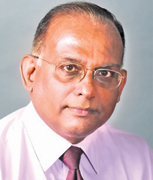Tourism industry lost a golden opportunity
by Lalin Fernandopulle
Sri Lanka Tourism under the former regime was a ‘one-man show’ that
paved the way to a half-baked administrative structure, lack of
transparency in data and stagnation in the number of employees that
stifled growth of the industry.
|

Srilal Miththapala |
A tourism industry expert said that the industry failed to capitalise
on the golden opportunity it received after a long spell to revive and
regain the momentum.
The industry that was manned by experienced professionals over the
years was confined to inexperienced and biased personnel who were mostly
‘yes men’ to superiors.
Sri Lanka Institute of Tourism and Hospitality Management Board
member and Past President of Sri Lanka Tourist Hotels Association Srilal
Miththapala said that the private sector which plays a pivotal role and
the real driver of tourism was poorly represented in the administration.
“The private sector representation was limited to a few who supported
the administration and did not make constructive criticism.
The administration had no clear strategic plan on how the industry
should be developed in a sustainable manner,” he said.
The objective of having the private sector representation is to
broadbase the tourism decision-making infrastructure, a move supported
by the Finance Act No. 25 of 2003 which enabled the collection ofself-imposed
cess form the industry for promotion and development.
The Sri Lanka tourism industry is a private sector led industry.
Apart from the meagre private sector representation, the
administrative structure was not set up according to the Tourism Act
which sought to unbundle the monolithic structure into four independent
bodies such as the Sri Lanka Tourism administrative structure which
comprises the Sri Lanka Tourism Development Authority, Sri Lanka Tourism
Promotion Bureau, Sri Lanka Institute of Tourism and Hospitality
Management and the Sri Lanka Convention Bureau which should be headed by
a chief executive officer.
“The four independent bodies of Sri Lanka Tourism were not headed by
separate heads in line with the Act,” Miththapala said.
There was no clear long-term marketing strategy to promote tourism.
Though ad hoc intense promotions helped promote tourism they were not
long-term strategies to develop the industry with a vibrant
private-public sector collaboration.As agreed upon by experts, although
short-term intense campaigns help gain quick results they are not
sustainable in the long term. They said it was more a ‘shotgun approach’
with ad hoc concentration of individual campaigns. Inconsistency in the
branding strategy reveals the ad hoc nature of marketing the
destination. The ‘Small Miracle’ branding strategy launched in 2008 was
laid to rest with Sri Lanka Tourism meandering through various ad hoc
slogans such as ‘Visit Sri Lanka 2011’, ‘Refreshingly Sri Lanka’ and
‘Wonder of Asia’.
Without a clear marketing strategy to identify our selling
propositions and positioning, long-term growth cannot be achieved,
tourism experts said. Untimely, inaccurate and delayed tourism data
hindered strategic decision-making. There had been controversy over
arrival statistics.
The methodology of computing arrival was changed suddenly in December
2013. The Sri Lanka Tourism Annual Statistical Report of 2013 which has
not still been published speaks volumes of the state of the
administration, experts said.
They said that the vast informal sector in the industry should be
regulated. There should be value addition to this sector through
training and regulation.
The shortage of staff is a time bomb that the industry has been
sitting on for several years. Currently there are around 75,000
employees in the hotel industry which needs around 200,000 to 300,000
workers to cater to the 2.5 million tourism arrival target. “There is
increased interest to join the tourism industry but with a wrong
perception. Many youngsters think that they could could reach the top
within a short time.
The path to achievement is arduous but success is assured to those
who strive,” Miththapala said. He said the hotel school should be
expanded to meet the growing need for staff. The school produces around
2,000 to 3,000 trained personnel each year. Unregulated institutions
have mushroomed in the country. The human resource shortage should be
addressed urgently to tide over challenges.
|

